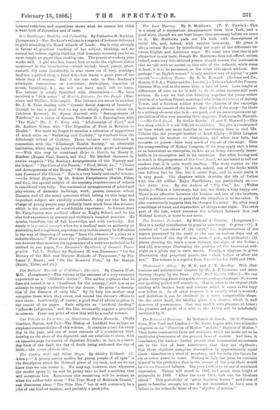good story, though we are kept longer than necessary before
we come to it. Mr. Matthews pads out his book with descriptions of social life, and, indeed, with another love-story. He gives it also a certain flavour by introducing the topic of the difference be- tween English and American ways. We must own that this is not altogether to our taste, though Mr. Matthews does not offend, unless,
indeed, some very thin-skinned person should resent the insinuation that we talk with an accent on this side of the Atlantic, while some at least, it is to be presumed, on the other side speak without. But perhaps "an English accent" is only another way of saying "a pure accent."—Aubray Tower. By B. W. Howard. (Ticknor and Co., Boston, U.S.A. ; Warne and Co., Lou don.)—This is a tale of the Franco. German War, and at the same time a tale of love. Love laughs at differences of race as he is said to do at other matters still more serious. So here we find him bringing together the young widow (victim of a loveless French marriage) who is the chdtelaine of Aubrey Tower, and a German soldier whom the chances of the campaign have made an inmate of the house. Both sides of the story—for there is a military element also in it—are good, and we must express our ap- preciation of that very amusing little coquette, Mademoiselle Manette. —His Good Angel. By Arthur Ready. (S. and R. Maxwell.)—This is a story which it is not difficult to criticise. The plot is constructed on lines which are more familiar in melodrama than in real life. Villains like the younger brother of Lord Ellaby—Wilfrid Langton encourages his brother to dissipation, and when this fails, has recourse to poison—have very much of the air of the stage. Then the masquerading of Esther Langton, if we may apply such a term to so benevolent an enterprise, strikes us as being extremely impro- bable in its conception and in its execution. But after having said so much in disparagement of His Good Angel, we are bound to tell our readers that it is quite worth reading. The story carries on the reader without difficulty. It is not, indeed, one of the books which
one follows line by line, but it never flags, and in some parts it is very good. The chapters which describe the life of Esther
with the old soldier, Major Pendlebnry, are particularly so.— Our Little Ann. By the Author of " Tip Cat," &c. (Walter Smith.)—This is a love-story, but not, we think, a very happy one.
There is an affection between the heroine and one of two brothers, and it somehow comes to pass that she transfers it to the other. It also conveniently happens that he changes his mind. So, after many searchings of heart and reproaches, all things come right. The other part of the tale, which concerns the relations between Ann and Michael Linton, is more to our taste.


































 Previous page
Previous page